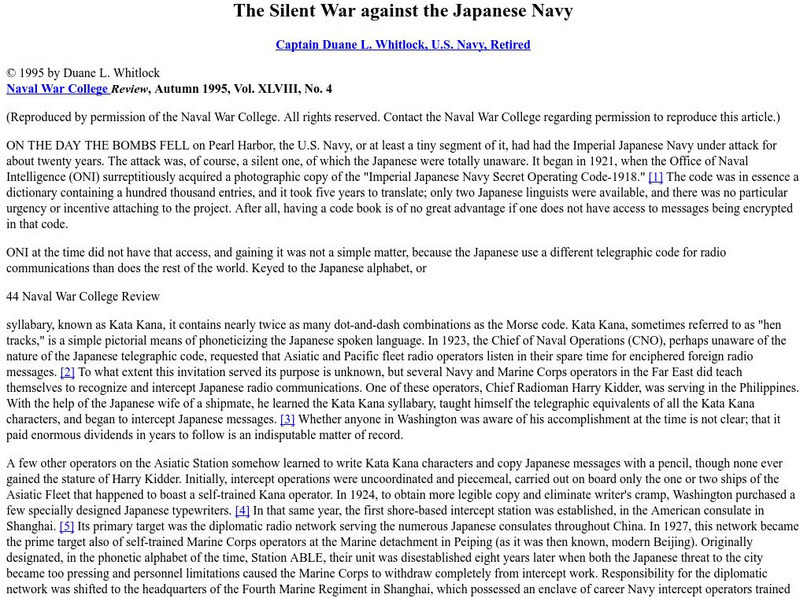Hi, what do you want to do?
Curated OER
Sentence Completion 20: High-Intermediate Level
Here's an exercise that will help learners develop their vocabulary. The eight sentence completion problems are followed by an answer key that explains why one answer is correct and why the other possibilities are not. Richly detailed,...
Curated OER
With Malice toward None: Lincoln's Assassination
Students analyze primary documents regarding Lincoln's assassination. In this lesson on Lincoln's assassination, students analyze three primary sources of information regarding President Lincoln's assassination.
Curated OER
Life Under German Occupation
In this social studies worksheet, students read the description of life under the occupation of Sweden by the Germans during the World War.
Curated OER
Habeas Corpus and“Enemy Combatants”
Students explore the implications of habeus corpus. For this habeus corpus lesson, students participate in reader's theatre activity regarding the origin of habeus corpus. Students then investigate the Hamdi v. Rumsfeld case and...
Curated OER
Entertaining Vancouver's Youth During World War II.
Young scholars investigate relevant period documents and artifacts and have the
opportunity to replicate a 1943-44 entertainment experience by viewing a program
of World War II era motion pictures on site at Vancouver's historic...
Curated OER
Ireland Quiz 2
In this Ireland instructional activity, students answer short answer questions about the history and geography of Ireland. Students complete 20 questions.
Curated OER
Playing it Straight
Students view live theatre. In this play productions lesson, students visit selected venues online or in person to see up to 32 plays in the United Kingdom.
Curated OER
The Warrior Role in Greek Society
Young scholars are introduced to the various gods and goddesses in ancient Greek mythology. In groups, they use print and electronic resources to research the ways Greek culture has influenced the modern world. To end the lesson, they...
Curated OER
With Malice toward None: Lincoln's Assassination
Students study the manhunt for, John Wilkes Booth, the man who assassinated Abraham Lincoln. In this lesson about a president, students write and role-play they are announcers who are informing the world of the...
Curated OER
Out & About
Students remember the Holocaust. In this Holocaust instructional activity students visit the websites for the Queen's Film Theatre, the Imperial War Museum, and the Jewish Museum to view information about the Holocaust and...
Curated OER
Audrey Hepburn
In this famous peoplelearning exercise, students read a passage about Audrey Hepburn and then complete a variety of in-class and homework activities to support comprehension, including partner interviews, spelling, cloze,...
Curated OER
America in Film and Fiction
Students begin the lesson by reading a book on film study. After watching the movie "Citizen Kane", they work together to identify the issues concerning the United States before World War II. As a class, they discuss how the ideas and...
Curated OER
Conspiracy Theory: Lincoln's Assassination
Young scholars determine how the Lincoln assassination impacted the United States. For this conspiracy theory lesson, students examine selected primary sources and chart the information they gather from the sources.
Curated OER
Why Do People Migrate?
In this migration worksheet, students complete tasks about migration including short answer questions, look at pictures, fill in the blanks, and more. Students complete 11 tasks total.
Curated OER
The Market Place, Derby, UK
In this city quiz series worksheet, students visit the Market Place in Derby, UK and answer questions about stores and activities available there. Students answer 20 questions.
Curated OER
Oliver Cromwell: Hero or Villain?
In this Oliver Cromwell worksheet, students read 10 facts about Cromwell and label each "hero" or "villain" depending on which each given fact supports.
Curated OER
Segregation - The Jim Crow Law
In this segregation activity, students read about the Jim Crow Laws and the effects they had on African Americans. Students learn about inequality during this time period.
British Library
British Library: 20th Century: Theatre Practitioners and Genres
From Stanislavski to Brecht and from Theatre of the Absurd to Theatre Workshop, explore some of the key influences and developments within 20th-century theatre practice.
Khan Academy
Khan Academy: Us History: 1844 1877: Later Stages of the Civil War 1863
In the year 1863, US General Ulysses S. Grant succeeds in securing the western theatre of war and moves east to take on Robert E. Lee. [5 min, 51 sec]
British Library
British Library: 20th Century: 20th Century Theatre
Find close readings, critical interpretations, and personal responses to the works of key 20th-century playwrights and practitioners, including Samuel Beckett, Harold Pinter, Shelagh Delaney, and Timberlake Wertenbaker.
Curated OER
Etc: Theatre of War in the East, 1861 1865
A map of the eastern seat of war during the American Civil War, showing cities, railroads, mountains and terrain, forts, rivers, and significant battle sites.
Other
The Mercury Theatre on the Air
Listen to many of the original Mercury Theatre of the Air broadcasts, with Orsen Welles, John Houseman, Agnes Moorehead and others. Also on the site you can find broadcasts of many of the programs from Campbell Playhouse, which is what...
Curated OER
Etc: Theatre of War in the United States, 1861 1865
A map showing the extent of the Confederate territories east of the Mississippi River during the American Civil War (1861-1865). The map shows state lines and capitals, major cities, forts, battle sites, and rivers in the region. The map...
ibiblio
Ibiblio: The Silent War Against the Japanese Navy
Extensive article which chronicles the efforts of U.S. Naval intelligence to read the secret radio messages of the Japanese Navy.
























